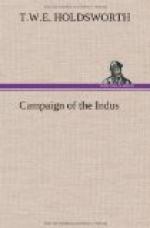To this short sketch of Afghanistan, and of the persons connected with its political history, I will add some extracts from the work of the Hon. Capt. Osborne, because they explain the circumstances which led to the campaign of the Indus, and to the restoration of Shah Shooja to the throne of Cabool. He says, “In May, 1838, a complimentary deputation was sent by Runjet Sing to the Governor-General at Simla, consisting of some of the most distinguished Sikh chiefs, who were received with all the honours prescribed by oriental etiquette. Shortly afterwards, Lord Auckland resolved to send a mission to the court of Lahore, not merely to reciprocate the compliments of the Maharajah, but to treat upon all the important interests which were involved in the existing state of political affairs in that quarter of the world. The recent attempts of the Persians on Herat, the ambiguous conduct of Dost Mahomed, and the suspicions which had been excited with respect to the proceedings and ulterior designs of Russia, rendered it of the greatest importance to cement the alliance with Runjet Sing, and engage him to a firm and effective co-operation with us in the establishment of general tranquillity, the resistance of foreign encroachment, and the extension of the benefits of commerce and the blessings of civilization. Accordingly, W.H. Macnaghten, Esq., was deputed on the mission to the Maharajah, accompanied by Dr. Drummond, Capt. Macgregor, and the Hon. W. Osborne, military secretary to the Governor-General.
“The object of the Governor-General’s mission to Lahore having been accomplished, and the concurrence, and, if necessary, the co-operation of Runjet Sing, in the restoration of Shah Shooja, secured, Mr. Macnaghten repaired to Loodiana, for the purpose of submitting to the Shah the treaties that had been concluded, and announcing to him the approaching change in his fortunes. The envoys seem to have been much struck with the majestic appearance of the old pretender, especially with the flowing honours of a black beard descending to his waist, always the most cherished appendage of oriental dignity. He had lived for twenty years in undisturbed seclusion, if not ’the world forgetting,’ certainly ‘by the world forgot,’ consoling himself for the loss of his kingdom in a domestic circle of six hundred wives, but always ‘sighing his soul’ towards the mountains and valleys of Afghanistan, and patiently awaiting the kismet, or fate, which was to restore him to his throne. The preparations thenceforward went rapidly on. The contingent raised by the Shah was united (more for form than use) to the British force, and in three months the expedition began its operations.”




